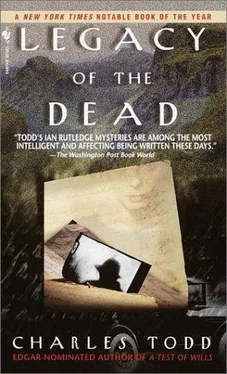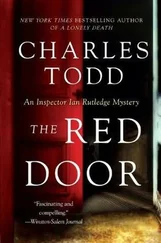Charles Todd - Legacy of the Dead
Здесь есть возможность читать онлайн «Charles Todd - Legacy of the Dead» весь текст электронной книги совершенно бесплатно (целиком полную версию без сокращений). В некоторых случаях можно слушать аудио, скачать через торрент в формате fb2 и присутствует краткое содержание. Жанр: Полицейский детектив, на английском языке. Описание произведения, (предисловие) а так же отзывы посетителей доступны на портале библиотеки ЛибКат.
- Название:Legacy of the Dead
- Автор:
- Жанр:
- Год:неизвестен
- ISBN:нет данных
- Рейтинг книги:5 / 5. Голосов: 1
-
Избранное:Добавить в избранное
- Отзывы:
-
Ваша оценка:
- 100
- 1
- 2
- 3
- 4
- 5
Legacy of the Dead: краткое содержание, описание и аннотация
Предлагаем к чтению аннотацию, описание, краткое содержание или предисловие (зависит от того, что написал сам автор книги «Legacy of the Dead»). Если вы не нашли необходимую информацию о книге — напишите в комментариях, мы постараемся отыскать её.
Legacy of the Dead — читать онлайн бесплатно полную книгу (весь текст) целиком
Ниже представлен текст книги, разбитый по страницам. Система сохранения места последней прочитанной страницы, позволяет с удобством читать онлайн бесплатно книгу «Legacy of the Dead», без необходимости каждый раз заново искать на чём Вы остановились. Поставьте закладку, и сможете в любой момент перейти на страницу, на которой закончили чтение.
Интервал:
Закладка:
“Thanks. I’ll see what I can learn there.”
Fraser put down his fork and reached for his glass. “She must have cared for Robbie,” he said. “To come all this way. Sad that they had no future.” He quoted lines from one of O. A. Manning’s poems. “We walked away from all that was warm and dear and stood frightened in cold rain where the guns fired, and in the end, we died in pain, the black stinking mud our shroud, embraced at last not by living arms, but by the bones of those who before us died…”
Rutledge recognized the words. But he said only, “Manning understood better than most.”
“Yes.” Fraser sighed. “Well, when you catch up with Eleanor Gray, if she isn’t happily married to someone else by this time, tell her Robbie loved her too. I truly think he did.”
“Do you know if Captain Burns kept a dog? A cat?”
“He didn’t. He traveled more than most. But his fiancee was fond of King Charles spaniels.” He smiled. “Julia would bring them whenever she came, nasty little monsters, always wanting to climb into one’s lap. How Robbie put up with them, I don’t know! Love is blind, I suppose.”
“Did Captain Burns bury one of them in his garden?”
“Good God, how should I know?” Then he grinned. “Killed it, you mean? Robbie must have been sorely tempted a time or two.”
Rutledge drove east out of the Trossachs, through some of the heart of Scottish history.
Many of the soldiers in France had seldom been farther from home than twenty miles in their short lives. Clan battles made for lively conversation among the Highlanders who had long memories for the feuds, ambushes, and massacres that had colored each family tree until the Battle of Culloden and the Highland Clearances had changed Scotland forever.
The Lowlanders had had a different perspective. Stirling, a great castle on a crag overlooking the Forth, had been a royal residence until James VI had taken himself off to London. Now it was a quiet county town lost in the backwaters of the past. Bannockburn, where the Scots had won their famous victory over the English, was a monument to Robert the Bruce’s determination to be free of the southern kingdom that had dominated his country for a lifetime. There were Scots who had only the vaguest notion now where the battle had been fought. Mary Stuart had been born at Linlithgow Palace, on its knoll above the loch. A queen from birth, she’d grown up to become a thorn in the flesh of Elizabeth of England. John Knox had thundered against Mary from the pulpit, and she had finally been forced to abdicate, a pensioner of the English crown. A rough and glorious past, now no more than a footnote in time.
The Highlands had been emptied and the Lowlands had become the poor cousin forgotten by an England with its eyes on Empire, and left to poverty and ignorance. As someone had said, Scotland’s greatest wealth, her sons, had bled away to the colonies. Half the Scots under Rutledge’s command had had distant cousins in Australia, New Zealand, or Canada.
At Edinburgh, Rutledge turned west. And decided, after some thought and a good deal of comment by Hamish, to go directly to Jedburgh rather than to Duncarrick. To report to the fiscal rather than to Oliver.
He stopped for a quarter of an hour at Melrose, whose ruined abbey held only a shadow of its former beauty. Stretching his legs as he walked through the broken elegance of nave and chancel, Rutledge tried to picture it as the Cistercians had built it. It was an important enough house that the heart of Robert the Bruce had been buried there, brought home from Palestine and lost for a time in Spain.
Melrose had fallen victim to the Border wars that had burned Duncarrick and Jedburgh and bled half the Marches.
But Hamish remembered only that Field Marshal Haig, commander-in-chief of the British forces during the war, had been born near here. He did not like Haig, and was restless until Rutledge drove on.
In Jedburgh, burns rose to meet Rutledge but did not offer his hand. “I understand from Oliver that we’re ready to go to trial. I could wish that you had been more successful in finding what has become of the Gray woman. This brooch most certainly puts the accused in the glen near the bones that were found, but it would have been helpful to go into court with proof of her identity clearly set out.”
“Perhaps before the trial begins that will also be answered to everyone’s satisfaction,” Rutledge answered pleasantly. “I came here to ask you about an officer who may have known your son. Let me describe him for you.” Without waiting for a response, he gave Burns what little information he had.
Burns listened patiently, then said, “That could fit half the British army.”
“Half the Army didn’t serve in Palestine.”
“Yes, yes, I take your point. And you’re trying to locate the man who might have driven Miss Gray to Scotland. I’m still not convinced that he knew my son. He might have been a friend of hers, have you considered that?”
Rutledge omitted any account of his visit to Craigness. He had a feeling it would not sit well with the fiscal. Instead he replied, “Yes. Either way, I must start with the assumption that both men visited Atwood House in Miss Gray’s company. Which makes it seem likely that your son did meet him. My hope now is that one of Captain Burns’s other friends might remember him also.”
“Most of my son’s friends were from his own unit, or men he met on leave.” Burns turned and looked out the window of his office. “A good many of them are dead.”
“This man was interested in the structure of the Atwood House stables. Medieval stonework.”
“In the building trade, then. But an officer, you said.”
“Or a student of medieval history.”
“A don.” He began to list his son’s friends, giving their names, their ranks, their pre-war occupations. Rutledge closed his notebook when Burns had finished.
Of the seventeen men Burns could name, nine were dead, three before 1916. Two others had died of wounds. None of them had served in Palestine, and none of them was a builder or a don. “Although as I think about it now, Tom Warren was interested in history. His father had been attached to the embassy in Turkey at one time, and the family had traveled widely in the Near East.”
A slim thread, Hamish pointed out as Rutledge took his leave.
It would have to do.
Rutledge drove on to Duncarrick to find a message waiting from Gibson. He had had no success in locating the engraver.
Finding Major Thomas S. Warren proved to be easier than Rutledge had expected. A call to the Foreign Office had brought him the name of the father, who had in fact been a diplomat and had come out of retirement during the war to serve as an authority on the Turks.
Thomas Warren was a solicitor in Durham. Nearly in Lady Maude’s backyard, as Hamish put it.
Rutledge set out with a box of sandwiches and a flask of tea, courtesy of The Ballantyne, and arrived in Durham before the hotel clerk had come on duty at The Bishop’s Arms. A bath and a shave did much for his appearance, but not for the fatigue that was catching up with him.
Durham had been built by fighting bishops, both castle and cathedral sitting on a well-defended bluff above the winding River Wear. On the other hand, one of the earliest names in English literature was buried here: the Venerable Bede. Before the war, Rutledge had had several friends in the town, but they were gone now. It seemed odd to drive through the familiar streets and not call on one of them.
The law firm was in the center of town, second in a row of buildings that were Victorian Gothic, with even a gargoyle or two leering down at passersby. The street was busy, and Rutledge left his motorcar at The Bishop’s Arms, walking the few streets to his destination.
Читать дальшеИнтервал:
Закладка:
Похожие книги на «Legacy of the Dead»
Представляем Вашему вниманию похожие книги на «Legacy of the Dead» списком для выбора. Мы отобрали схожую по названию и смыслу литературу в надежде предоставить читателям больше вариантов отыскать новые, интересные, ещё непрочитанные произведения.
Обсуждение, отзывы о книге «Legacy of the Dead» и просто собственные мнения читателей. Оставьте ваши комментарии, напишите, что Вы думаете о произведении, его смысле или главных героях. Укажите что конкретно понравилось, а что нет, и почему Вы так считаете.












